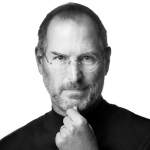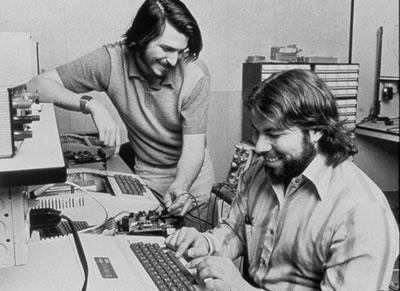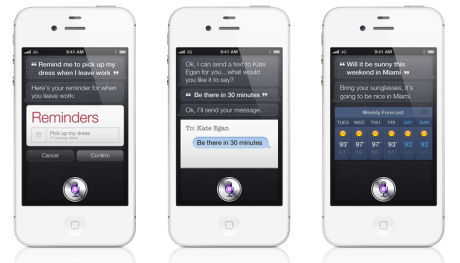Steve Jobs Changed the World (Again) The Day Before He Died
Posted by Andrew on October 6th, 2011 Steve Jobs wasn’t just a man with great vision and instincts, he was a man that bet big on people, teams and concepts he believed in. Apple computers exist because Steve saw the potential in his friend Steve Wozniak’s hobbled together motherboard. The graphical user interface exists because Steve realized this academic notion that nobody knew what to do with was something that would make computers more personal, more accessible. He bet big on a couple of PhD’s and a fired Disney animator and shepherded Pixar for over a decade so it could eventually change entertainment and re-ignite the magic of storytelling.
Steve Jobs wasn’t just a man with great vision and instincts, he was a man that bet big on people, teams and concepts he believed in. Apple computers exist because Steve saw the potential in his friend Steve Wozniak’s hobbled together motherboard. The graphical user interface exists because Steve realized this academic notion that nobody knew what to do with was something that would make computers more personal, more accessible. He bet big on a couple of PhD’s and a fired Disney animator and shepherded Pixar for over a decade so it could eventually change entertainment and re-ignite the magic of storytelling.
At the Apple announcement the day before Steve Jobs passed away, we got another one of Steve Jobs’s visions of the future, a final legacy that will change everything, all over again. Like all his other visions, it was dismissed as obvious, incremental or no big deal. A year from now may prove otherwise.

From the beginning Steve Jobs has been dedicated to changing the way we interact with computers, making them more personal. Early Macs had text to speech functionality and primitive speech recognition. Both of these technologies have matured slowly over the last two decades. Neither in a groundbreaking moment. Part of the problem is that converting human speech into text is only a small part of the challenge.
Software and systems like Nuance, Vlingo, Google Voice Recognition and others have come a long way. But they still needed that magic touch to make them into practical alternatives. To do that you need three things: A powerful engine that can convert speech into text. Artificially intelligent software that can understand all the different ways you can phrase something and learn what you mean. And an over-arching idea on how it comes together and what it’s supposed to do for real people.
Watch the demonstration of the Siri voice assistant and you’ll see how Jobs and Apple saw beyond the present state of things and combined all three. Apple acquired the company and talent behind Siri because Steve Jobs recognized a team that got the way of the future. It wasn’t speech recognition. It was human understanding.
Siri is an AI system that learns things like an intelligent person. If you tell it “My mother’s name is Patricia”, it will remember that. When you tell it next time to “Send an email to my mom”, Siri knows that the “Patricia” in your contact book is who you meant when you say “mom”.
Speech recognition everywhere else is literal. It makes people bend to the way computers do things. You have to phrase things a certain way and be very specific. This has always been the antithesis of computing for Jobs. He believed that computing should conform to people.
Siri is built upon a lot of powerful technologies and concepts. Pundits who just saw it as another speech recognition platform totally missed the bigger picture. It’s a very big idea. If you ask it a question it doesn’t just do a Google search, it uses computational systems like WolframAlpha. Want to know the current distance to Mars for your kid’s homework? Siri will give you the actual answer and not just a search result that’s outdated and wrong.

A year from now voice interaction is going to be much more commonplace. It’ll go from just being text to speech and literal instructions, to a much more natural way to interact with our devices. Google’s impressive technology will continue to evolve. Apple’s Siri will get smarter. Other companies will continue to come up with brilliant contributions. iPhones, Androids and other devices will get better and better.
We’re about to see a paradigm shift in computing. All of the elements were there before. Natural language processing, speech recognition, AI. So was the GUI and mouse, the touchscreen, the MP3 player, the smartphone and the tablet. What they needed was someone to show us how to look at them and how to make them fit into everyday life so much so they become almost invisible.

Steve Jobs has always worked to put the hardware and the machine in the background. Siri is the next evolution of that goal. When you see the promotional video for the technology, it doesn’t feature people interacting with a piece of hardware, it’s merely a medium. It shows us people using technology in the most natural way possible, simply telling it what they need it to do. The last part of the video is the most touching. We see a young blind girl reading a Braille book and using her iPhone – a device she can’t even see – to send messages, interact and communicate with the rest of the world, the same as anyone else would. This is Steve Jobs legacy. This is how he changed the world, again.
Steve may passed away, but we’re only beginning to understand how big of a dent he kicked in the universe.
October 30th, 2011 at 12:15 pm
Your post is dead on. I have a son with autism who is non-verbal so this speech app doesn’t really fit him. However, Steve did something remarkable to help my son and many others anyway. There is an app in the iTunes store called proloque2go that actually gives my son a voice and subsequently shows us just how intelligent he really is. I thank God that we had Steve Jobs to lead the way in these areas. If you’re interested in my small tribute to Steve go to my blog at: debstake.wordpress.com